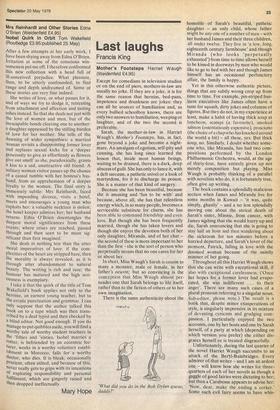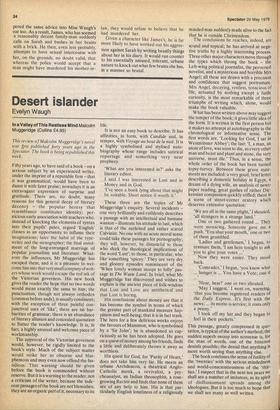Last laughs
Francis King
Mother's Footsteps Harriet Waugh (Weidenfeld £4.95) Except for comedians in television studios or on the end of piers, mothers-in-law are usually no joke. If they are a joke, it is for the same reason that hernias, bed-pans, impotence and drunkness are jokes: they can all be sources of humiliation and, as every bullied schoolboy knows, there are only two answers to humiliation, weeping or laughter, and of the two the second is preferable.
Sarah, the mother-in-law in Harriet Waugh's Mother's Footsteps, has, in fact, gone beyond a joke and become a nightmare. An amalgam of egotism, self-pity and cunning, she has long since learned the lesson that, inside most human beings, waiting to be drained, there is a dark, deep abscess of guilt. She has only to lance it, with a deft sarcasm, a pathetic snivel or a look of martyrdom, for it to discharge its poison. She is a master of that kind of surgery.
Because she has been beautiful, because she is amusing and 'fun to be with' and because, above all, she has that relentless energy which, in so many people, becomes a serviceable substitute for charm, she has been able to command friendship and even love. But though she has been frequently married, though she has taken lovers and though she enjoys the devotion both of her only daughter, Miranda, and of her char — the second of these is more important to her than the first — she is the sort of person who perpetually moans that no one cares for her or about her.
In short, Miss Waugh's Sarah is cousin to many a monster, male or female, in her
father's oeuvre; but so convincing is the conception that Miss Waugh almost persuades one that Sarah belongs to life itself, rather than to the fiction of others or to her own imagination.
There is the same authenticity.about the homelife of Sarah's beautiful, pathetic daughter — an only child, whose father might be any one of a number of men —with her husband James and their three children, all under twelve. They live in 'a low, long, eighteenth century farmhouse' and though Miranda (who looks 'perpetually exhausted') from time to time allows herself to be kissed in doorways by men who would like to go to bed with her and though James himself has an occasional perfunctory affair, the family is happy.
Yet in this otherwise authentic picture, things that are subtly wrong crop up from time to time. For example, pin-striped business executives like James often have a taste for squash, dirty jokes and columns of figures. But they do not, in my experience at least, make a habit of having thick soup at luncheon, scampi (a favourite), smoked salmon (ostentatiously expensive), prosciutto (the choice of a chap who has knocked around the world a bit) — all these, yes. But thick soup, no. Similarly, 1 doubt whether someone who, like Miranda, has had two compositions performed by the London Philharmonic Orchestra, would, at the age of thirty-four, have entirely given up not merely composition but playing. Miss Waugh is probably thinking of a parallel with novelists who do, it is fortunately true, often give up writing.
The book contains a splendidly malicious section when James and Miranda live for some months in Kuwait — 'it was, quite simply, ghastly' — and a no less splendidly moving one about the stoical death of Sarah's sister, Minnie, from cancer, with James wIshing that she would hurry up and die, Sarah announcing that she is going to stay half an hour and then wandering about the sickroom for ten minutes before a hurried departure, and Sarah's lover of the moment, Patrick, falling in love with the doomed woman because of the saintly manner of her going.
Throughout all this Harriet Waugh shows that she can write with exceptional skill, if also with exceptional carelessness. ('Once her hopes for a former lover had evaporated, she was indifferent . . . to their anger'. There are many such cases of a plural pronoun referring to a singular noun. Sub-editor, please note.) The result is a book that, despite minor exasperations of style, is singularly impressive in its mixture of devasting cynicism and grudging compassion. I particularly enjoyed the two accounts, one by her hosts and one by Sarah herself, of a party at which (depending on which version you prefer) she either disgraces herself or is treated disgracefully.
Unfortunately, during the last quarter of the novel Harriet Waugh succumbs to an attack of the Beryl-Bainbridges. Every admirer of that writer — and I am an ardent one — will know how she writes for threequarters of each of her novels as though a gaggle of good fairies were dictating to her; but then a Carabosse appears to advise her: 'Now, dear, make the ending a corker.' Some such evil fairy seems to have whis pered the same advice into Miss Waugh's ear too. As a result, James. who has seemed a reasonably decent family-man suddenly calls on Sarah and bashes in her brains with a brick. He then, even less probably, attempts to have sexual intercourse with her, on the grounds, no doubt valid, that whereas the police would accept that a man might have murdered his mother-in law, they would refuse to believe that he had murdered her.
Given a character like James's, he is far more likely to have worked out his aggres sion against Sarah by writing beastly things about her in his diary. It would run counter to his essentially amused, tolerant, urbane nature to knock out what few brains she has, in a manner so brutal.



































 Previous page
Previous page